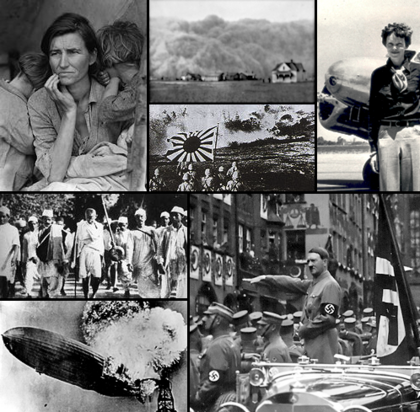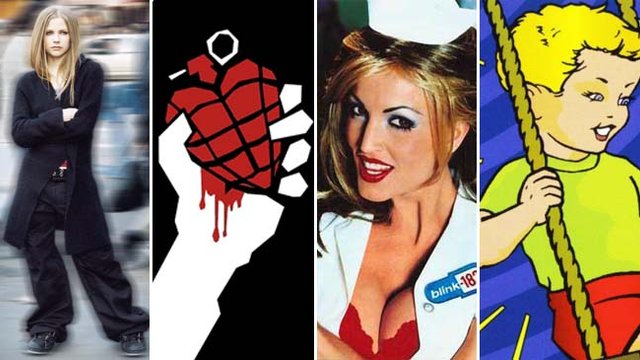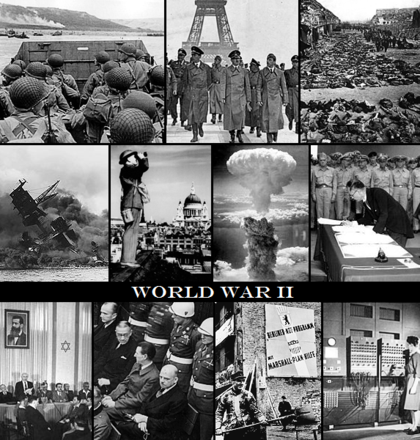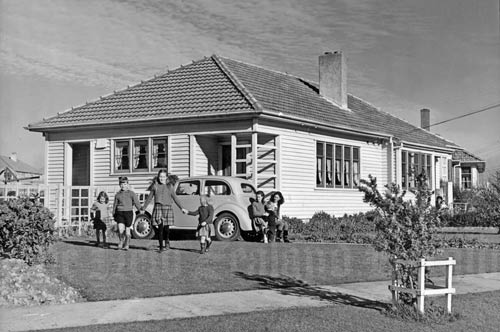However, in no century is this truer than the 20th Century. In that century alone, the world has gone from traveling by horse and buggy and having the newspaper as the only source for what was happening in the outside world, to having the internet and being able to communicate with someone from the other side of the world right in the comfort right in your own home. Now, we're only a stone throw away from being a score into the 21st Century, and the world has changed further, we're now in the age of smartphones, tablets, smart TVs, PCs, and what have you that can stream books, videos, video games, or music whenever you want it to, it's now easier to make friends with someone from the other side of the world, to play video games with them, make a video together with them, and it's easier to date someone from the other side of the world as well.
Today, we're going to be focusing on the last ten decades, the 1920s-2010s, and determine how transformative all ten decades were, by ranking them in terms from most stagnant to most transformative, looking at all the social, pop cultural, political, and technological advances, whether they came out in that decade or became standard in that decade, to determine which decades are more transformative, and which ones are more stagnant.
With that out of the way, let's get on with the list;
10. The 1930s
The biggest reason the '30s are at the bottom of this list is that the decade was heavily stagnated by the Great Depression, which lasted throughout the entirety of the decade. Not only that but a lot of the changes that did happen in this decade already had footprints in the '20s. However, that's certainly not to say that this decade was totally void of transformability, as it wasn't. This was the decade in which landmarks such as the Empire State Building, Golden Gate Bridge, and Hoover Dam were completed, the latter of which was a result of the New Deal enforced by then-president Franklin D. Roosevelt. Speaking of which, the New Deal itself was a huge landmark within American History, it was with that deal that programs such as the CCC, FHA, SSA, and many others of which we still live by today, came out of. It was also in this decade in which a racial barrier in sports was broken by Olympic Athlete Jessee Owens, whom won four gold medals and was the most successful athlete at 1936 Summer Olympic Games in Berlin. Also, there are the technological changes. This was the decade in which you had King Kong, the first blockbuster monster film, which innovated the use of stop-motion animation, a standard of which many later films would go by up until CGI became more available. This is also the decade when colorized films really started out, with the innovation of three-strip Technicolor, with the release of Becky Sharp in 1935, and the cel-animated Snow White & The Seven Dwarves in 1937, both of which were very revolutionary for their time. Also, at the tail end of the decade, you had the start of World War II, with Britain and France declaring war on Nazi Germany following the invasion of Poland.
9. The 1970s
This decade ranks at the near bottom as it was far more stagnant than the last few decades before and next few decades after. It was a decade fully after the social revolution of the '60s, but before the big tech revolution of the next three decades following it. That being said, this decade still had plenty of significant changes that keep it from being at the bottom. This was the peak in popularity for rock music, as well as saw the advent of rock subgenres such as metal and punk, sure the latter technically started in the '60s, but it didn't truly emerge on its own until Black Sabbath released their self-titled album, which is widely considered the first metal album. It was also in this decade when Color TV became standard, as well as when personal computers, VHS players, and video game consoles first became a thing. At the end of the decade, you had music starting to become electronic with the rise of New Wave, the first mainstream rap song, as well as "Video Killed the Radio Star". This was also a pretty transformative time politically as well. Although Richard Nixon's legacy is certainly tainted by Watergate, we should not forget that he was the one who established a detente with the USSR and China, which were baby steps to ending the Cold War, as well as the one who ended the draft, created the EPA, signed Title IX and the National Cancer Act, and met with legislators from southern states to bring a full end to segregation. Later in the decade, president Jimmy Carter would broker a peace treaty between Israel and Egypt, although unfortunately for him, it was also around that time the Iranian Revolution occurred.
8. The 2010s
Granted, being that this decade is still not finished yet, it may seem rather unprofessional to judge it in this category. That being said though, we're only a stone's throw away from 2020, so any changes that happen until then would just be last moment changes for the decade, maybe this list will be revamped if I edit it a year and a half from now, maybe not. The biggest changes by far in this decade are the political ones, with trust in the mainstream news media plummeting, with the rise of ISIS and new tensions with Russia and to a lesser extent China, a rise in terrorist attacks and mass shootings, as well as an apex in Political Correctness leading to a big rise in the Alt-Right Movement. American society is now at the most divided it's been since the Civil War, which is nearing 160 years ago! As for technology, this was the decade in which smartphones became standard, as well as an essential to every life. Netflix and other video streaming services became the standard movie platform, Spotify and other music streaming services became the standard music platform, Amazon surpassed Walmart, and many retail stores are now going out of business. Plus, the advent of self-driving cars, which are guaranteed to become more standard by the 2020s. All of these changes alone help this decade rank in the middle of the bottom 5 despite the fact that the decade isn't over yet, but I believe even once the decade is done, it probably won't move a spot, but we'll see.
7. The 1980s
A large number of technologies that we take for granted today either started out or were popularized in the '80s. Video games became much more popular in the early part of this decade with the advent of arcade games such as Pacman, Galaga, and Donkey Kong, and later on, in the decade, it became an industry standard with the advent of the Nintendo Entertainment System. This was also the decade in which Cable TV and VHS became standard, and even Personal Computers started making their way into homes. The Walkman became tremendously popular and began an era of kids listening to music on portable devices, which they are still doing now. This was also when the first commercially available mobile home first entered the market, and when microwaves really started to become a standard within people's homes. Pop culture saw a very big change with the advent of MTV when music videos started exploding in popularity, and with the music industry becoming commercialized as a result. Mainstream music also became more electronic and synth-based, and rap music started to become far more popular and confrontational, this started with Grandmaster Flash's "The Message" in 1982, but by 1988, once you had NWA debut in the mainstream with "Straight Outta Compton", gangsta rap had entered the mainstream and was now challenging the status quo. There was also a big shift politically, with Ronald Reagan's presidency, and the final chapter of the Cold War, with Reagan increasing spending to challenge the USSR while also increasing diplomatic efforts with Soviet president Gorbachev, his Berlin Wall speech in 1987, all the way to the Fall of the Berlin Wall in 1989, which was really when the Cold War truly ended.
6. The 2000s
First off, this was the decade that brought us into a brand new century, and on top of that, a brand new millennium. Beyond that, this decade saw a huge political change with the advent of the 9/11 terrorist attacks in 2001, after that came to the War on Terror, and the Department of Homeland Security. Plus, at the tail end of the decade, the US elected its first African American president when Barack Obama won the 2008 election against John McCain. The biggest change of all though in the '00s was the technological change. In the early years of the decade, the internet became a standard in American homes, but then in 2004, you had high-speed internet surpass the adoption rates of dial-up, ushering in a new high-speed era for the internet. Later on, you had the advent of YouTube, popularizing a new form of media that is free to produce and consume. Plus, you had social media go from an alternative media to a dominant media in this decade as well, plus with the internet going portable with the advent of the PSP and smartphones. Netflix launched its streaming service and Spotify launched in this decade, and HD started to overtake CRT TVs and composite video by the end of this decade.
5. The 1990s
The '90s started out with the last days of the USSR, with it finally collapsing by Christmas Day 1991, bringing the world into a new Post-Cold War World Order. It was also in this decade when modern political correctness started out, and when the crime rate began to rapidly decline. Fashion became much more similar to what we know now, with sneakers and baseball caps becoming casual fashion. Music went through a very huge change in this decade, starting with mainstream music sharing an '80s residual theme, until the advent of the grunge music, g-funk, and Britpop ushered in a new era, mainstream music got more edgy and confrontational, until the latter part of the decade when you had the rise of Y2K bubblegum pop. However, by far, the biggest change of the '90s was in the technology department. This was the decade in which video game industry went from the 8-bit NES being Nintendo's popular console in 1990, to the 128-bit Dreamcast being Sega's popular console in 1999, plus PC gaming becoming more popular as well. Cell phones started becoming more mainstream, and you had Toy Story ushering in the age of CGI animated movies. By far, however, the biggest innovation of the '90s was the World Wide Web, which first went public in 1991, and started to become mainstream in 1995 with the advent of Windows 95. By the decade's end, only a little under half of the American households had an internet connection. At the tail end of the decade, there was Columbine, which for the first time brought mass media and social attention to the issue of school shootings.
4. The 1950s
The '50s are often regarded as "the First Modern Decade". Officially, that moniker belongs to the '20s, but it isn't hard to see why the '50s is often regarded as such. The '50s were the first decade to take place completely after World War II, and it was a decade in which American society began to resemble much of what it is today. For one this is the decade in which construction on the Interstate Highway System was first authorized, by then-president Dwight Eisenhower in 1956. For two, this is the first decade of the Television Age, as television became standard in American homes by 1954. The most successful and revolutionary TV show of the '50s was the sitcom "I Love Lucy", for the fact that it popularized the concept of TV sitcoms, and it also pushed racial boundaries, as Lucille Ball, both on the show and in real life, was married to Cuban-American Desi Arnaz, which was highly controversial at the time. It was also in the '50s when the Civil Rights Movement really came in full swing, with the Supreme Court ruling segregation unconstitutional in the Plessy vs. Ferguson and Brown vs. Board of Education cases, as well as with the rise in riots and resistance coming from African Americans, most notable case being Rosa Parks. It was also in this decade when Hugh Hefner would publish the first Playboy magazine, featuring Marilyn Monroe. This new series of magazines would be a prelude to what would eventually be the Sexual Revolution of the decade following. Very notably about the '50s is the rise in youth culture, with drive-in theaters, burger joints, a more casual sense of fashion, and with the Rock & Roll and Rockabilly movement led at the forefront by Elvis Presley, whom is still to this day the second best selling music artist of all time, plus you also had the rise in a youth counter-culture as well, with the greaser and beatnik counter cultures being fully established in this decade. To top it off, this is the decade in which NASA was formed.
3. The 1920s
The '20s is the decade with the official moniker of being "The First Modern Decade", and it's not hard to see why. With the American economy booming following World War I, the American public was able to spend their money on goods and appliances that have since become a standard of modern American living. It was in this decade when automobiles, radio, electric stoves, and telephones all became standard, plus when appliances such as electric refrigerators, washing machines, vacuum cleaners, irons, and toasters really started making their way into homes. In the later years of the decade, you had the birth of commercial aviation, as well as commercially sold pre-sliced bread, and I'm sure you've all heard the saying, "the greatest thing since sliced bread". With all of this, the '20s was the decade that birthed Mass Culture. Another momentous milestone of the '20s is the Jazz Age, which in many ways birthed the age of modern pop culture. With prohibition in place came the rise of speakeasies and a nightclub culture in which jazz musicians were hired as entertainment, plus there was also the Great Migration of African Americans moving from the south to northern cities such as Chicago, Detroit, and New York, where the Jazz Age really exploded. The '20s were also a major breakthrough decade for cinema, with the term "celebrity" first becoming a thing, with the advent of Walt Disney with the first Mickey Mouse cartoons, plus the first Silly Symphony cartoons at the tail end of the decade, with "The Jazz Singer" coming out as the first feature film with recorded dialogue and popularizing the age of talking films, and even the first talkie feature-length film in COLOR, "The Viking", was released in 1928! Plus, there was also a bit of a sexual revolution in this decade as well, with flapper fashion becoming popular, with the diaphragm becoming more widely available, and most notably with the 19th Amendment in 1920 allowing women the right to vote. A more modern political landscape also really began to take shape in the '20s, with communism and fascism on the rise in Europe, and an anti-communist Red Scare becoming widespread across the United States, to the point where immigration really began to become a controversial issue.
2. The 1960s
According to CNN, the '60s are "the decade that changed the world", and the decade is very often argued to be THE most transformative and revolutionary decade of the modern era. Sure, it may have not ranked as first on this list, but it sure as hell is in the competitor spotlight, being in second place. Western society went through a drastic change in this decade. It was in this decade when the Civil Rights Movement reached its apex, with Martin Luther King's "I Have a Dream" speech in 1963. Only a year later, the Civil Rights Act of 1964 was passed, and a year after that there was the Voting Rights Act of 1965. It was also in this decade when The British Invasion would bridge the gap between American and European youth culture, with The Beatles at the forefront, plus this would also be when rock music would go from being a fad to a music industry standard. Youth culture, in general, would also start to play a major role in global affairs, with tensions towards the Vietnam War and the rise of the Hippie Movement and student protests, one of the biggest reasons for this being the fact that this was when the Baby Boomer generation, which was monumentally bigger than the one preceding it, was starting to come of age. The '60s were also the decade of the official Sexual Revolution, with women's fashion becoming more revealing, and pre-marital sex and birth control becoming normalized. African Americans also began to develop their own distinct culture around this time, with Motown becoming popular, afros becoming more common, and with the Black Power Movement in which African Americans became far more confrontational towards the white conservative American status quo. Crime rates and riots also went on the rise, all of this was all part of the Social Revolution of the '60s, what Western society had become in 1969 was a complete contrast to the way it was in 1960, the conservative status quo that was revered in previous decades took a huge beating in the '60s. To top it all off, this was the decade when the Golden Age of Hollywood ended, as well as the decade in which the First Super Bowl happened. The technological changes in this decade were a lot smaller compared to the social, political, and pop cultural changes, but there still were some of them. For one, this was when commercially available color television sets first became a thing, when the handheld calculator and cassette tape were first invented, and at the end of the decade, you had the first ATM machine, and you had man walk on the moon for the first time.
1. The 1940s
So, how is the '40s at the top of this list, how is this decade more transformative than the '60s or even the '20s? How? Three words; World War Two. If there's one event that truly shaped the modern world, it was most certainly World War II, the most deadly and most expensive war in human history. The technological advances of World War II were momentous, Penecilin became more mass distributed, the cavity magnetron was developed for the improvement of Radar and invention of the Microwave Oven, synthetic oil and rubber was first developed, jet engines became a standard in airplanes, the V-2 missile, the precursor to space rockets, was first launched, and even the first computer, ENIAC, was invented. The end of the war is when the world entered the modern era, in fact, there's even a TIME magazine article referring to 1945 as "The Year That Changed The World", and it most certainly was. The war ended with atomic bombs being dropped on Hiroshima and Nagasaki, bringing the world into the Nuclear Age. Fascism and colonialism came to an end, and modern-day international institutions that we still live by today such as the United Nations and International Monetary Fund first came into place, and in 1949, the first Geneva Convention was held. Tensions between the United States and the Soviet Union would bring about the beginning of the Cold War, and in 1949, the North Atlantic Treaty Organization, or NATO, was first formed. World War II veterans returning home also brought about a huge shift in American society as well, with the rise of suburbia and the beginning of the baby boom, the nuclear family had become the societal norm. It was also in this decade when television started to make its way into homes, as well as when the Long Play Record became a thing, being introduced in 1948 by Columbia Records. Believe it or not, the '40s were also the first decade of youth culture as well, even though it wasn't as ubiquitous as it was in the '50s, it was still there. Frank Sinatra was the first true "teen idol" with a plethora of giddy teenage female fans, and would even be the one to pioneer the concept album in 1946 with "The Voice of Frank Sinatra". Teens in this decade also started taking part in social outings such as dance halls and the Monkey Parade during this decade.
So what are your thoughts, comments, or concerns regarding this list? I'd love to hear them.
Anyways, I hope you've found this entry to be fun and educational.






















